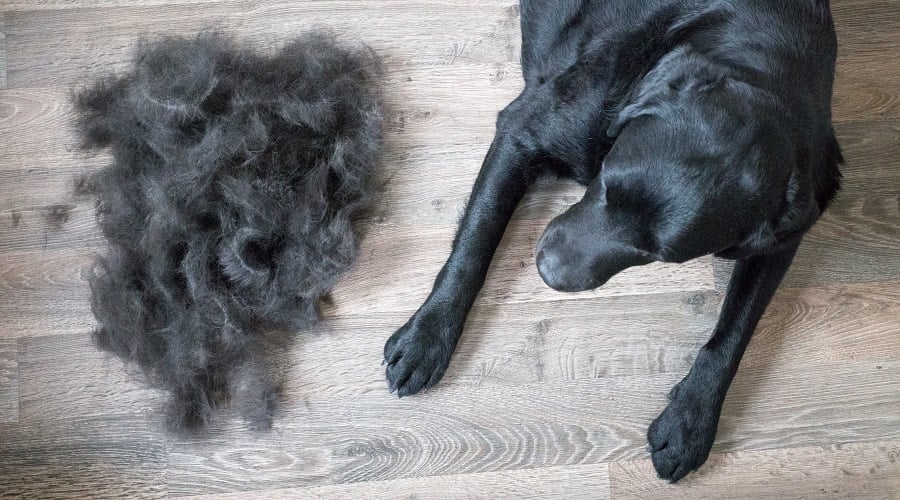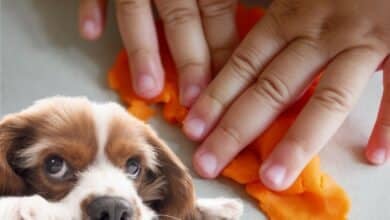Help! My Dog Just Ate Petunias! What Should I Do Now?
When you purchase through links on our site, we may earn a commission. Here’s how it works.
If your dog just ate some petunias, you are likely worried that they might be toxic to dogs. After all, most dogs will end up eating something they shouldn’t be eating at some point in time. Petunias are lovely cheery summer bedding or hanging basket plants that many people use to brighten up their gardens. Unlike other plants, you don’t have to worry about Petunias much in the winter because it blooms in summer and lasts through autumn. There are several different types of petunia in a variety of colors.
Table of Contents
So are petunias actually safe for dogs? The short answer is yes, petunias are actually quite safe for dogs, and there’s usually no reason to worry if your pup has eaten a few. You may need to pay a visit to your vet if your pup is allergic or has consumed too much.
In the article below, we talk about why petunias are generally safe for dogs. We also cover what you should do if your canine companion is having an allergic reaction or just flat-out ate too many in one sitting.
Are Petunias Toxic For Dogs?
Unlike Hydrangeas or Tulips, Petunias are not toxic flowers and are, therefore, a great choice when choosing what to plant in your garden if you have pets. While ingestion of these plants is unlikely to cause any harm, you should not actively encourage your pup to eat them. This could lead to them accidentally eating other flowers that might be poisonous.
ASPCA has no reports of any part of the petunia plant being toxic to dogs. There are also no known reports of them being toxic to other domestic pets, such as cats and rabbits. Eating a large volume of any plant material could cause a dog mild gastrointestinal upset. So, although not toxic, you should discourage your dog from eating anything out of your gardening beds.
My Dog Just Ate Petunias: What Now?
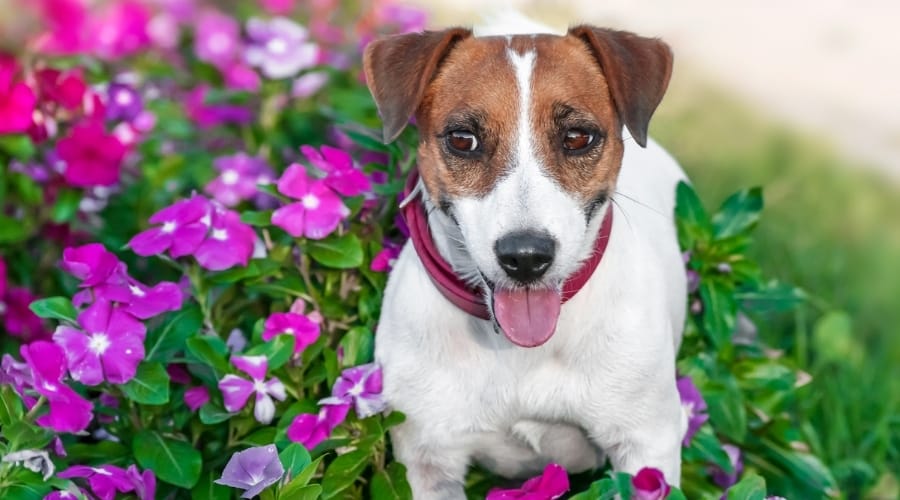
Again, in most cases of petunia consumption, there’s not much you will need to do. But if your dog is showing any signs of stomach upset, lethargy, or weakness, then there are some steps you will want to take right away to make sure your pup gets the proper care they need.
Step #1: Put Fido in a Safe Space
Remove your dog from the area to stop them from eating anymore. While eating petunias shouldn’t cause any problems, you should discourage it. You will also want to keep your pup tucked away to make sure they didn’t ingest any other potentially harmful plants in your garden.
Step #2: Check Nearby Plants
Check to see if there are any other half-eaten plants nearby. You may want to check if any of your other plants or flowers have been eaten, as some of these may be more harmful. If there are others that your pup consumed, make a list so it’s on hand when you contact your vet.
Step #3: Check Your Dog’s Health
Make sure your pup seems healthy and responsive. Most dogs will be absolutely fine after eating petunias, so if your dog is showing signs of ill health, you may want to check whether there is anything else that they could have consumed.
Step#4: Do Your Research
If you are unable to identify other plants your pup may have eaten, check the ASPCA website. Use this resource to help you formulate your plant list for your vet. If your pup ate any potentially poisonous plants, you will need to contact your veterinarian immediately.
Step #5: Contact Your Veterinarian
Phone your veterinarian if you are worried. If you notice erratic behavior, or you are concerned that they have eaten something other than just the petunias, then you may want to give your veterinarian a call for some advice.
What if My Dog Ate An Entire Petunia Plant?
If your pup just consumed the entire petunia plant, it’s actually pretty unlikely that it will cause any harm. Similar to Dandelions, and most species of Hibiscus, Petunias are a pet-safe plant. Many dog owners have them in their gardens, and this includes all parts of the plant.
If your dog has eaten a high volume of plant material this could cause some mild self-limiting gastrointestinal upset, the same as eating anything outside of his normal diet might. There’s also a chance that if your pup ate an entire plant, they may have consumed a styrofoam container or other packaging that the plant may have come in. You’ll want to check to be sure.
If your canine companion is showing more concerning signs such as lethargy, weakness, disorientation, severe vomiting, or diarrhea, then you should check that there aren’t any other plants in your garden that they might have consumed. Regardless of the cause, you should phone your veterinarian for advice if your pet is reacting negatively.
Petunia Poisoning Treatment
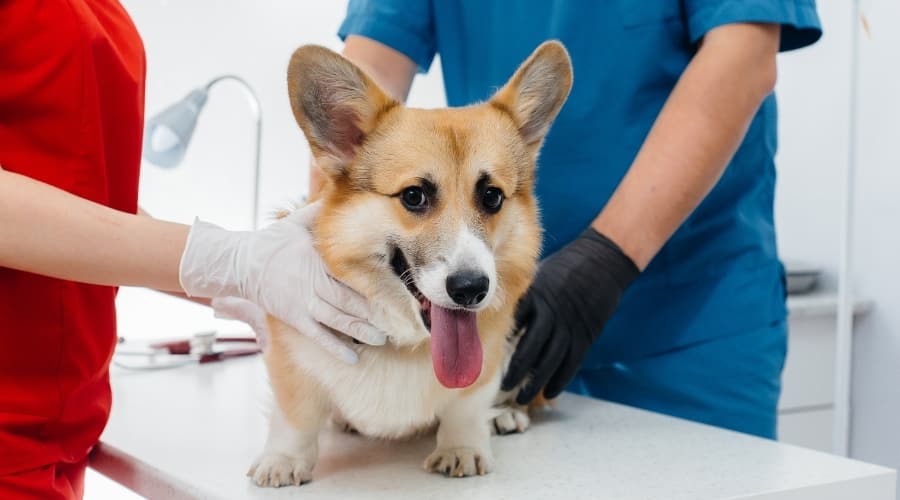
There is no specific treatment for petunia consumption in dogs. These plants are not toxic to most domestic species. You shouldn’t expect to see any side effects, and no medical intervention is needed.
If your pup is showing symptoms of toxicity, then you should take them to your veterinarian for treatment. You want to be prepared in case there is something else they may have consumed. The fact they have eaten petunia plants could be a ‘red herring’, which just confuses you. There very well could be something else going on that you weren’t aware of.
Your veterinarian will perform a physical examination to check your dog’s mental status, heart rate, and abdomen for bloating and discomfort, amongst other things. If they have any concerns, they may advise running some additional tests.
This might include a blood panel to check hematology for signs of infection or anemia and biochemistry to assess things like their liver, kidneys, and blood sugar. If dehydration is present due to vomiting and diarrhea, then they may need to stay in the hospital for intravenous fluids and monitoring.
How Can I Stop My Dog From Eating Petunias?
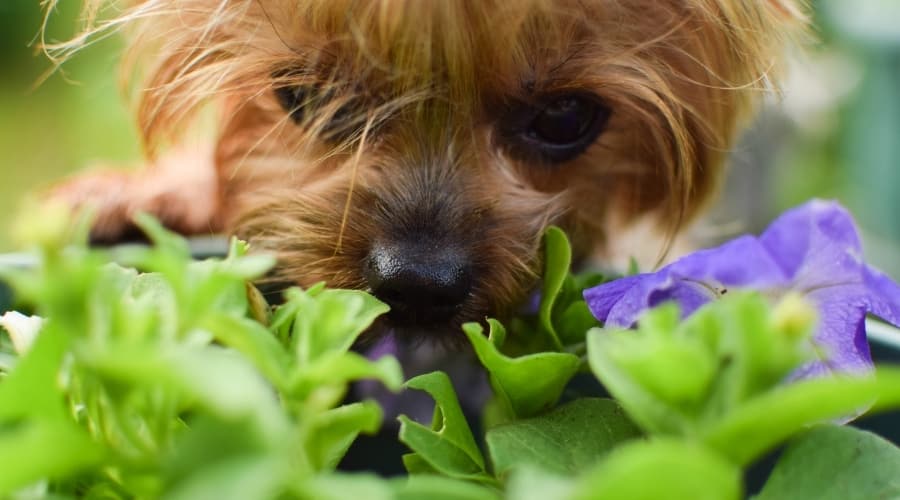
If your dog is showing an unhealthy interest in your garden plants, then you may want to try and stop them. You want to keep your pup safe and also stop them from ruining your garden.
You might want to fence off portions of your yard so that your pup is kept away from heavily-planted zones. Alternatively, you could consider spraying plants with bitter-tasting sprays like bitter apples to put your dog off from chewing. Just check the spray you are using is safe for both plants and animals.
Ultimately, training your pup to stay away from your plants is the best way to prevent problems. Consider positive reinforcement such as clicker training to improve his recall so that if he is approaching your plants, you can call him away from them again with ease. A behaviorist or dog trainer may be able to assist you if you are struggling with destructive canine behavior.
You might want to remove or replant any poisonous plants from your garden if your dog is a persistent offender. This will help keep them safe while you start implementing their training program. Increasing exercise and providing toys and games to improve their mental stimulation can also help reduce destructive behaviors.
Some drugs, especially steroids, will increase a dog’s appetite. An increased appetite can also be a sign of some serious diseases such as diabetes and Cushing’s. If your pup has suddenly started eating plants, as well as everything else in sight, you may want to consider a vet visit to make sure there’s nothing going on.
Frequently Asked Questions
Can eating a petunia kill a dog?
No, eating a petunia shouldn’t kill your dog. They are a great non-toxic plant to have in pet-friendly gardens. Other safe flowers that would be safe in your garden include:
- African violets
- Orchids
- Asta
- Sunflowers
- Roses
- Lavender
- Freesias
What happens if my dog ate petunia leaves?
Just like the flower, the leaves shouldn’t cause harm. Of course, too much of anything isn’t good, and if your dog ate a whole batch of leaves from a Petunia, we’d recommend contacting your vet. It’s especially important to act quickly if your dog is showing signs of illness or lethargy.
Why is my dog suddenly eating plants?
A lack of mental stimulation could cause dogs to show destructive behaviors as a method to help alleviate their boredom or perhaps as a way of seeking your attention (albeit negative attention). It would be worth seeing whether you could increase your dog’s exercise regime to help keep them happy and stimulated.
Exercise is a good way of burning off energy, but even just going out and getting a change of scenery with new smells and sights is just as important to dogs. Playing with your pet and grooming them will also give them plenty of positive attention.
Dogs may also show changes in behavior or appetite due to underlying medical conditions. Pica is a condition where dogs eat non-food items, which could be plants or could be other items like soil, bedding, stones, etc. Ensure your dog is on a complete and balanced pet food diet to ensure there are no underlying nutritional deficiencies.
Speak to your veterinarian, especially if your dog is showing any other abnormal symptoms. Polyphagia, or an increase in appetite, can be seen with a variety of medical disorders. They will be able to advise you as to whether any diagnostic tests are required to investigate things further.
What flowers are poisonous to dogs?
There are some flowers you should avoid growing in your garden, especially if your dog enjoys chewing on plants. Here is a brief list of some common toxic garden flowers, some of which can be fatal if consumed:
- Daffodils: Any part of the plant can cause severe gastrointestinal upset, but especially the bulbs, which some dogs will dig up and chew.
- Foxgloves: Poisons within this plant can have serious adverse effects on the heart.
- Primroses: These flowers can cause vomiting, depression, and skin problems.
- Orchids: Some orchids can cause problems, but they usually aren’t toxic.
- Rhododendrons: All parts of the plant can cause vomiting, depression, and even coma.
- Lilies: These can be toxic to dogs but also very toxic to cats.
- Tulips: Contain tulips glycosides that cause problems in dogs such as drooling, vomiting, and difficulty breathing. As with daffodils, the bulbs can be particularly harmful.
What if my dog is allergic to petunias?
Many dogs will not show any interest in garden plants at all, so in some cases, these plants may never cause us concern, but it is worth being aware of the possible dangers.
Usually, an allergy in most dogs will show up in the form of a skin rash. Severe allergic reactions are quite rare. If your pup is acting lethargic, then you will definitely want to contact your veterinarian and bring your dog in to be seen.
Final Thoughts
Petunias are a good choice of flower to have in your garden as they are very pet safe and are non-toxic. If, however, your dog is showing an unhealthy interest in plants, generally you should look to improve your dog’s mental stimulation and implement a training regime to work on their behavior.
If you have any concerns that your dog is showing signs of ill health, then speak to a veterinarian in case there is something else going on with your pet that needs investigating.
